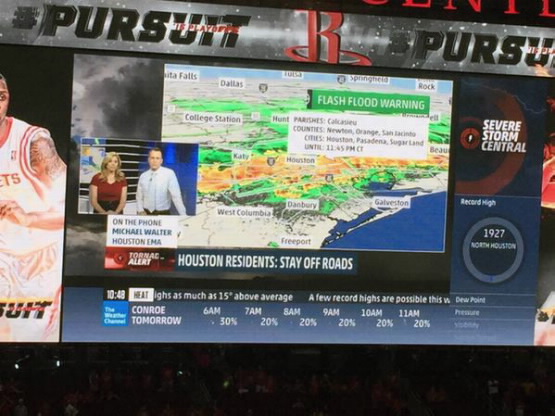How Do You Reward and Recognize Your Team?
“Getting an audience is hard. Sustaining an audience is hard. It demands a consistency of thought, of purpose, and of action over a long period of time.” –Bruce Springsteen
No matter what type of venue we work in—whether it is a 1,500-person club, a 50,000-person stadium, or a 80,000-music festival—as venue operators, we all share the same goal: to deliver the world’s greatest guest experience for our fans attending the event. Whether you are a performer on stage or the first baseman for an MLB team, we all have a role in delivering that experience.
At Nationals Park, we recognized a culture needed to be developed that unified all our game day team members (over 2,700) that instilled passion and pride that everyone is part of the Nationals family. Our goal was to find a way to connect our staff with our guests for every event we hosted, so they would continue to come back every time. Every guest we seated, every cash transaction, every car we parked, and bag we search is an opportunity for our staff to make a memorable and lasting impression for our guests. How do you teach your team the importance of this?
TEAM Service was developed to create a culture of service excellence for all Nationals Park game day team members regardless of the company they work for. We are one unified team whose members work together to satisfy and delight our guests, creating a memorable experience for each and every one. Part of this commitment to our guests is that we expect all team members, regardless of their individual department or company, to go above and beyond to satisfy our guests and handle any conflict with care and respect for the individual. Do you have a program that all departments are a part of, that your game day team is a part of?
As we are building our program and still continue to improve it everyday, we hold monthly meetings with the 12 different department managers that make up our different game day staff departments consisting of:
• Guest Experience team
• Box Office team
• Ticket Services team
• 50/50 team
• Grounds crew
• Scoreboard team
• Tour Guides
• Food and Beverage team
• Parking team
• Security team
• Housekeeping team
• Entertainment team
It is important that in our monthly meetings we are asking questions of what is working well and what we need to improve upon. We speak directly with our game day team, listening to what they are looking for and what we can improve upon as leaders, too. In defining this program, it was more than just an awards and recognition program, but creating a family, with a mission statement, core values, and logo that were separate, but aligned with our organization’s core values. We created a game day staff brand.
Our logo, mission statement, powerful quotes, and core values are in our game day staff entrance (called the TEAM Service entrance), every break room, our training programs we call “work shops” and “Spring Training,” and some of our rewards such as length-of-service pins and MVP awards. By creating this brand, we were able to see our guest comments rise and our guests becoming apart of our TEAM Service rewards and recognition program where they vote for the MVPs of the Year. How do you reward and recognize your team?
We continue to find new ways to create that service excellence we all strive for, but remember that each time our game day staff are in the building to recognize them for going above and beyond the call of duty to help deliver the world-class guest experience we want for every event.
(Image: Joseph Gruber/Creative Commons)
The Value of Chapter Meetings
The world of venue management evolves constantly. How do facility managers keep up with the latest techniques to deal with an onslaught of issues that affect our ever-changing society and certainly the daily demands on our venues? In light of recent incidents that deal with issues related to crowd management, cybersecurity, home-grown terrorism, Wi-Fi, severe weather, and more, our members are able to respond swiftly to address the growing demands on staff personnel and to ensure patrons are protected. IAVM members are equipped to implement strategies so that attendees feel safe enough to attend live events.
To assist our members with the tools they need, IAVM offers a variety of critical networking opportunities throughout the year. Among the array of IAVM national educational events, sector conferences, and schools, IAVM Chapter Meetings have enabled local communities across all markets to convene and discuss trends that impact venues and share best practices. These events offer education, ideas to promote forward thinking, and of course, an exchange of information with peers. And sometimes, these meetings are just plain fun. Chapters offer local members and potential members an option to learn, grow your network and develop important relationships that can assist when there is a greater need. The moral of the story, meet your neighbors!
To create a chapter meeting in your city or community where several venues exist, basic hosting tips and resources are available at http://iavm.org, click on the About tab, select Regions and Chapters, select your region, then Chapter Meeting and check out the overview, and proceed to Hosting a Meeting. You will find steps you can take to start planning meetings in your community.
Please check out the FM June/July 2014 article online: Let’s Talk Chapter Meetings by Kathy Lowrey and Nick Zazal, IAVM membership committee. We hope to see you at VenueConnect this summer, August 1-4! Questions: contact IAVM’s membership director, Gina Brydson, at 972.906.7441, or via email at gina.brydson@iavm.org.
(Image: dirkb86/Creative Commons)
Eric Hart, CFE, Receives the 2015 Ray W. Ward Award
 Congratulations to Eric Hart, CFE, recipient of the 2015 Ray W. Ward Award, presented by the Regents of the Venue Management School (VMS) at Oglebay (which began 29 years ago with the generous support of the IAVM Foundation). The announcement was made by Regents Chair Michael Marion and was presented at the graduation banquet on June 11.
Congratulations to Eric Hart, CFE, recipient of the 2015 Ray W. Ward Award, presented by the Regents of the Venue Management School (VMS) at Oglebay (which began 29 years ago with the generous support of the IAVM Foundation). The announcement was made by Regents Chair Michael Marion and was presented at the graduation banquet on June 11.
“I am honored and humbled by being named the recipient of this year’s Ray Ward Award,” said Hart, president and CEO of the Tampa Sports Authority. “Ray’s legacy with VMS is legendary, a person who has been a mentor to me since I become involved with the school. To receive the award named for this icon is the greatest recognition I could ever imagine.”
The award recognizes an individual associated with VMS whose dedicated service and extraordinary contributions over a period of at least six years have resulted in significant and long lasting improvements to the overall success and quality of the school. The award was created and initially presented to Ward in August 1996.
“I’ve known Eric for many years, and his recognition is especially satisfying,” Ward said. “He has served in many capacities, all of which benefited the school, including as Regents Chair. He has served well, with great enthusiasm and has focused his considerable abilities and energy on expanding and improving all of the elements of the school.”
A Connected Culture in Your Venue
For the first time ever, two team owners sat down during the NBA Finals to discuss organizational success: Dan Gilbert, owner of the Cleveland Cavaliers, and Joe Lacob, owner of the Golden State Warriors.
The full session at Chat Sports: The Minds Behind the Game is available above, and several anecdotes shared during the conversation highlight how leadership and technology are two major ingredients in building a connected culture.
The potential of court-side virtual reality (VR) seats for future revenue was mentioned, and the 39-minute mark includes a brief discussion on the Veritix (just merged with AXS) Flash Seats ticket environment and how “fair, liquid, visible markets” are good for everyone and can help eliminate fans showing up at the box office with invalid tickets.
But above and beyond specific technology, it was the opportunity to listen to customers through social media that Gilbert focused on.
“A guy the other day complained that the cupholder on his seat was broken,” Gilbert said. “He tweeted it to me and the Cavs, I forwarded it to our guy, and within six minutes we’re up there fixing it. If you use social media right, you can get that real, live customer feeling that you can’t get in the ivory tower.”
Building a culture of connectivity, evidenced by Gilbert’s example, is where organizational leaders play a massive role.
For example, Lee Zeidman (@LeeZeidman)—president of STAPLES Center, Microsoft Theater, and L.A. Live—tweets backstage pics and gives away tickets to games and concerts. Look at his feed, and you’ll see photos of Kanye’s birthday party, video of the Nokia-to-Microsoft name conversion, and a ticket giveaway for opening night games to the Lakers, Clippers, and Kings.
What are you doing to build a connected culture with your customers?
If you need a little nudge (or a loving shove) into your role as a culture builder in social media, register for VenueConnect and do not miss Tweets From the Top: How Venue Executives Are Excelling in the Social Stream (Aug 2, 3:30 p.m.).
Weather Preparedness Needs to be a Priority
“If you want to see the sunshine, you have to weather the storm.”
– Frank Lane
With more experience in the world of sports rather than meteorology, Frank Lane perfectly summed up what all venue managers need to keep in mind regarding severe weather. There are many different potential threats from the sky we all could face throughout the calendar year, but preparation will yield positive outcomes during some of the most challenging situations. Let’s start by reviewing some of the severe weather situations to be aware of and opportunities to better prepare venue staff and guests when these conditions present themselves.
As I type this piece for the IAVM Stadium Committee blog, the state of Arizona will experience the remnants of two hurricanes in a period of 10 days. June is normally the driest month of a year for an area that knows something about dry conditions. Before Hurricane Andres, there had been no measurable rain recorded in Phoenix on June 5 since record keeping started over 100 years ago. Bottom line, just when you think it can’t happen, Mother Nature has a strange way of reminding us that, yes, it can happen.
There is evidence and forecasts of a calmer weather cycle in the near term. According to National Oceanic and Atmospheric Administration’s (NOAA) Climate Prediction Center, the Atlantic Basin, including the Gulf of Mexico and the Caribbean Sea, has a 70 percent chance of a below-normal hurricane season. NOAA predicts a likely development of El Nino during the summer or early fall and a 70 percent chance of six-to-11 named storms, which includes Tropical Storm Ana that formed in May. This comes on the heels of a similar, below-average Atlantic hurricane season that produced only eight named storms in 2014, the fewest since the 1997 Atlantic hurricane season. Conversely, the Eastern Pacific has a 70 percent chance of an above-normal season according to NOAA, with 15-to-22 named storms, of which seven-to-12 are expected to become hurricane strength.
Damage reports from tornadoes are much more likely to be seen on TV or the Internet. While the average number of tornadoes has been lower than normal, the threat remains. There were 888 tornadoes confirmed in the U.S. in 2014, of which 47 fatalities resulted. There were at least 903 tornadoes confirmed in the U.S. in 2013, accounting for 55 fatalities. So far this year, 716 tornadoes were reported according to the Storm Prediction Center (SPC), of which at least 343 have been confirmed. While the number of deaths so far is only nine, it has been a particularly tragic first six months in China with over 100 deaths from tornadoes.
The strongest tornadoes this year were part of a two-day severe weather episode traveling across parts of the Great Plains and Midwestern United States. The most significant event of the outbreak was a violent, long-tracked, very high-end EF4 wedge tornado that moved along a 30.2 mile-long path across several counties in northern Illinois, killing two people and injuring another 22. Winds in this area were estimated to have reached 200 MPH, the very upper limit of the EF4 range. Overall, this relatively small outbreak produced 22 tornadoes, of varying intensity and duration, across populated portions of the country.
Preceded by more than a week of heavy rain, a slow-moving storm system dropped tremendous precipitation across much of Texas and Oklahoma during the nights of May 24–26, 2015, triggering record-breaking floods. Additionally, many areas reported tornado activity and lightning. Particularly hard hit were areas along the Blanco River in Hays County, Texas, where entire blocks of homes were leveled. On the morning of May 26, the National Weather Service issued a flash flood emergency for southwest Harris County (which includes the city of Houston) and northeast Fort Bend County. The system also produced deadly tornadoes in parts of Mexico and Texas. A total of 31 deaths are connected to this weather event, with 27 occurring in Texas.
 Finally, lightning is a very real danger that needs to be considered during event days. There have been six documented lightning deaths in the U.S. this year, occurring in five different states. According to statistics recorded by NOAA, during the 10-year period of 2004-2013 a total of 33 people were killed and 234 were injured by lightning strikes annually. On average, lightning strikes are fatal to about 10 percent of people who are struck. And while the vast majority survives, they often suffer from an array of long-term, often debilitating symptoms.
Finally, lightning is a very real danger that needs to be considered during event days. There have been six documented lightning deaths in the U.S. this year, occurring in five different states. According to statistics recorded by NOAA, during the 10-year period of 2004-2013 a total of 33 people were killed and 234 were injured by lightning strikes annually. On average, lightning strikes are fatal to about 10 percent of people who are struck. And while the vast majority survives, they often suffer from an array of long-term, often debilitating symptoms.
Regardless if you are golfing, at a youth sports practice, or overseeing an event at your venue, no place outside is safe when thunderstorms are in the area. If you hear thunder, lightning is close enough to strike you. Immediately move those you are responsible for (including yourself!) to safe shelter, a substantial building, or inside an enclosed metal-topped vehicle.
The forecasting of severe weather has shown amazing advances in the past 10 years. Following are some topic points to keep in mind for your venue:
National Weather Service (NWS) Forecasts – Unless your stadium is hosting a National Special Security Event as deemed by the Department of Homeland Security, your local NWS will not (and cannot) provide specialized, site-specific forecasts or direct forecasting support to a venue manager. Conversely, NWS personnel are required to inform a designated public safety official when weather conditions may threaten life or property. The role in which NWS products and forecasts are utilized during events should be defined well in advance.
Communication of severe weather information – How many of our guests and employees simply tune out these warnings anymore? Past results show that threeout of every four times the NWS issues a formal tornado warning there is no evidence of one actually touching down. Thus the effectiveness of tornado warnings have reduced over the years, so much so that a test program by the NWS will feature new and more graphic descriptions of the potential damage and risks that people are likely to confront. The language used in a venue’s public safely announcements should balance the information people need to know with the call to action to seek a safe location immediately.
There was no better example of informing guests of severe weather than after a NBA playoff game in Houston. With a strong line of thunderstorms pushing through the area, venue management displayed weather information on the main videoboards and encouraged guests to stay inside the facility.
Have a Weather Watcher (with a clearly defined role) – Within your event command center or 24-hour security office, the monitoring of current weather is critical. Free weather websites and smartphone apps can provide an enormous amount of data in real-time. However, no venue staff member should be asked to interpret a local radar image or try to predict the path of severe weather. Venue managers need to determine if it’s prudent to employ a private meteorology company to provide this expert analysis to base life safety decisions upon.
Earlier this year, IAVM’s Academy for Venue Safety & Security (AVSS) offered a specialized course in Severe Weather Preparedness. The course will be offered again in 2016. The IAVM AVSS Severe Weather Planning Guide is an excellent resource to use when reviewing a venue’s emergency preparation and response plan. The importance of this plan cannot be overstated – it is a fundamental responsibility for all venue managers.
Weather preparedness needs to be a priority. The potential occurrence and damage from the skies outweighs most all of the other scenarios we train for. Take the time during the next sunny day to plan for what to do when the dark storm clouds appear on the horizon.
Do you want to receive a Front Row News weekly digest?
Categories
- Allied (856)
- Architecture (147)
- Arenas (744)
- Career (890)
- Convention Centers (889)
- Education (608)
- Events (1,528)
- Food & Beverage (193)
- Foundation (113)
- Guest Experience (1,482)
- Industry News (2,253)
- Leadership (1,872)
- Marketing (150)
- Membership (1,985)
- Music (212)
- Performing Arts Centers (453)
- Professional Development (398)
- Research (127)
- Safety & Security (425)
- Sports (763)
- Stadiums (607)
- Student (159)
- Technology (515)
- Ticketing (92)
- Touring (82)
- Trends (357)
- Uncategorized (768)
- Universities (216)
- Video (25)
- Young Professional (198)
Twitter Feed
- Twitter feed loading
Recent Posts
- Fort Worth Unveils Plans for Phase 2 of Convention Center Transformation
- San Diego Convention Center CEO Announces Retirement After a Decade of Leadership
- City of Fort Worth Names Sanchez Serrano Public Events Director
- Notice of Membership Dues Increase
- Invest in Your Association. Invite the Future.
Categories
- Allied
- Architecture
- Arenas
- Career
- Convention Centers
- Education
- Events
- Food & Beverage
- Foundation
- Guest Experience
- Industry News
- Leadership
- Marketing
- Membership
- Music
- Performing Arts Centers
- Professional Development
- Research
- Safety & Security
- Sports
- Stadiums
- Student
- Technology
- Ticketing
- Touring
- Trends
- Uncategorized
- Universities
- Video
- Young Professional
Archives
- February 2026
- January 2026
- December 2025
- November 2025
- October 2025
- September 2025
- August 2025
- July 2025
- June 2025
- May 2025
- April 2025
- March 2025
- February 2025
- January 2025
- December 2024
- November 2024
- October 2024
- September 2024
- August 2024
- July 2024
- June 2024
- May 2024
- April 2024
- March 2024
- February 2024
- January 2024
- December 2023
- November 2023
- October 2023
- September 2023
- August 2023
- July 2023
- June 2023
- May 2023
- April 2023
- March 2023
- February 2023
- January 2023
- December 2022
- November 2022
- October 2022
- September 2022
- August 2022
- July 2022
- June 2022
- May 2022
- April 2022
- March 2022
- February 2022
- January 2022
- December 2021
- November 2021
- October 2021
- September 2021
- August 2021
- July 2021
- June 2021
- May 2021
- April 2021
- March 2021
- February 2021
- January 2021
- December 2020
- November 2020
- October 2020
- September 2020
- August 2020
- July 2020
- June 2020
- May 2020
- April 2020
- March 2020
- February 2020
- January 2020
- December 2019
- November 2019
- October 2019
- September 2019
- August 2019
- July 2019
- June 2019
- May 2019
- April 2019
- March 2019
- February 2019
- January 2019
- December 2018
- November 2018
- October 2018
- September 2018
- August 2018
- July 2018
- June 2018
- May 2018
- April 2018
- March 2018
- February 2018
- January 2018
- December 2017
- November 2017
- October 2017
- September 2017
- August 2017
- July 2017
- June 2017
- May 2017
- April 2017
- March 2017
- February 2017
- January 2017
- December 2016
- November 2016
- October 2016
- September 2016
- August 2016
- July 2016
- June 2016
- May 2016
- April 2016
- March 2016
- February 2016
- January 2016
- December 2015
- November 2015
- October 2015
- September 2015
- August 2015
- July 2015
- June 2015
- May 2015
- April 2015
- March 2015
- February 2015
- January 2015
- December 2014
- November 2014
- October 2014
- September 2014
- August 2014
- July 2014
- June 2014
- May 2014
- April 2014
- March 2014
- February 2014
- January 2014
- December 2013
- November 2013
- October 2013
- September 2013
- August 2013
- July 2013
- June 2013
- May 2013
- April 2013
- March 2013
- February 2013
- January 2013
- May 2012
- March 2012
- December 2011
- November 2011
- October 2011
Recent Comments
- Frank Bradshaw, Ph.D., CVE on John Meyer, CVE, a Tireless Advocate of Certification for Venue Professionals, Has Died
- Neil Sulkes on Hilary Hartung, Friend to Many in Venue Marketing, Has Left Us
- Jason Parker, CVE on The Devastation of Hurricane Helene and How We Can Support One Another
- Larry Perkins on Touhey Testifies Against Speculative Ticketing Before Congressional Subcommittee
- Peter Secord on Major Players for Planned Elkhart Amphitheater Were in the Mix at VenueConnect



